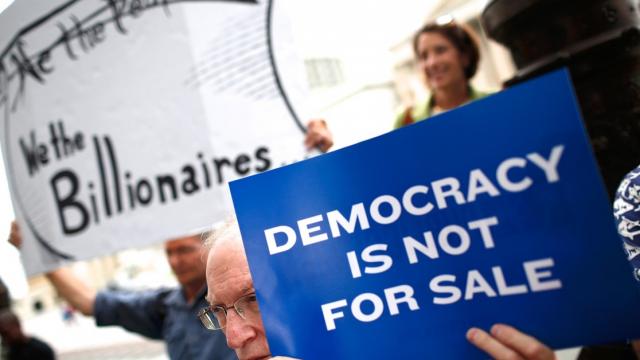
The 2016 White House race is well on its way to being the most expensive in history.
Presidential candidates and the political groups supporting them combined to raise more than $837 million during 2015, driven by a massive influx of cash to big-money super PACs, according to a Center for Public Integrity analysis of new campaign finance filings.
The new filings show that Democratic presidential candidates Hillary Clinton and Bernie Sanders, as well as Republican contenders Ted Cruz and Marco Rubio, ranked among candidates whose campaigns raised the most impressive sums in 2015. This effectively ensures they’ll remain in the presidential race long past Monday’s Iowa caucuses.
Nearly half of the presidential money raised in 2015 came from super PACs, which have no contribution limits. Republican White House hopefuls have been particularly reliant on them. Super PACs backing GOP presidential contenders raised one-third more cash last year than the candidates’ own committees — a significant departure from four years ago, when GOP presidential candidates out-raised their supportive super PACs by more than 3 to 1.
Federal regulators sanctioned super PACs in 2010 following the U.S. Supreme Court’s Citizens United v. Federal Election Commission ruling and a lower court decision. They’re supposed to avoid coordinating their spending with politicians they support, but many nevertheless are closely tied.
The result: The presidential campaign is now a super PAC-fueled arms race where almost everyone has a money bomb.
Some political observers say the increased flow of big money into political campaigns has helped give voters more choices and information. But others fret that wealthy donors have hijacked elections, distorted the public policy process and skewed politicians’ priorities.
“Super PACs likely encouraged more candidates to get into the 2016 GOP presidential race,” said Jay Goodliffe, a political science professor at Brigham Young University. “Even if their polls were not initially good, or there were other setbacks, the super PAC could help keep them afloat.”
But the widespread embrace of super PACs isn’t shared by Adam Lioz, a policy advisor at the left-leaning think tank Demos. “Your success and your longevity as a candidate should depend upon the people you can rally to your cause,” he said — not a few people writing “million-dollar checks.”
“People are tired of being bombarded by ads, especially when they know that those ads are paid for by the ‘one percent,’” he said.
3 WAYS TO SHOW YOUR SUPPORT
- Log in to post comments











